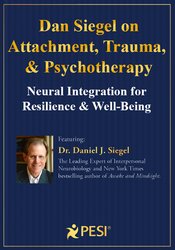

Join world-renowned neuropsychiatrist and New York Times bestselling author of Brainstorm and Mindsight, Dr. Daniel Siegel, in this recording on his revolutionary approach to psychotherapy.
Applying the latest brain science techniques to help your clients overcome trauma and working with their underpinning attachment disruptions is key to improving their well-being.
Drawing from his 30+ years of psychotherapy, as well as the latest research from the field of interpersonal neurobiology, you'll learn easy-to-master skills and interventions that will transform your practice and improve treatment outcomes with trauma clients.
You will also greatly benefit from bringing the following back to your practice:
Don’t miss your chance to see Dr. Siegel’s powerful work that has been presented for His Holiness the Dalai Lama, Pope John Paul II, the King of Thailand, Google University, London’s Royal Society of Arts, and TEDx.
We’re sure the knowledge and clinical skills from this recording will forever change your approach to client care.
| File type | File name | Number of pages | |
|---|---|---|---|
| Manual - Dan Siegel on Attachment, Trauma & Psychotherapy (1.54 MB) | 31 Pages | Available after Purchase | |
| Manual - Dan Siegel on Attachment, Trauma & Psychotherapy - French (1.54 MB) | 31 Pages | Available after Purchase | |
| Manual - Dan Siegel on Attachment, Trauma & Psychotherapy - Italian (1.54 MB) | 31 Pages | Available after Purchase | |
| Manual - Dan Siegel on Attachment, Trauma & Psychotherapy - German (1.54 MB) | 31 Pages | Available after Purchase | |
| Manual - Dan Siegel on Attachment, Trauma & Psychotherapy - Spanish (1.54 MB) | 31 Pages | Available after Purchase |

Dr. Dan Siegel is the founder and director of education of the Mindsight Institute and founding co-director of the Mindful Awareness Research Center at UCLA, where he was also co-principal investigator of the Center for Culture, Brain and Development and clinical professor of psychiatry at The School of Medicine.
An award-winning educator, Dan is the author of five New York Times bestsellers and over fifteen other books which have been translated into over forty languages. As the founding editor of the Norton Professional Series on Interpersonal Neurobiology (“IPNB”), Dan has overseen the publication of over one hundred books in the transdisciplinary IPNB frame which focuses on the mind and mental health.
A graduate of Harvard Medical School, Dan completed his postgraduate training at UCLA specializing in pediatrics, and adult, adolescent, and child psychiatry. He was trained in attachment research and narrative analysis through a National Institute of Mental Health research training fellowship focusing on how relationships shape our autobiographical ways of making sense of our lives and influence our development across the lifespan. Financial: Dr. Dan Siegel serves as the Medical Director at the Lifespan Learning Institute and is the Co-Founder and Director of Education at the Mindsight Institute. He is also the founding editor of the Norton Series on Interpersonal Neurobiology. Dr. Siegel receives royalties as a published author and serves as a scientific advisor for the Inner Development Goals initiative and as an advisor for the Center for Child Well-Being. Additionally, he receives honoraria and recording royalties from Psychotherapy Networker and PESI, Inc. Dr. Siegel has no relevant financial relationships with ineligible organizations.
Speaker Disclosures
Financial: Dr. Dan Siegel serves as the Medical Director at the Lifespan Learning Institute and is the Co-Founder and Director of Education at the Mindsight Institute. He is also the founding editor of the Norton Series on Interpersonal Neurobiology. Dr. Siegel receives royalties as a published author and serves as a scientific advisor for the Inner Development Goals initiative and as an advisor for the Center for Child Well-Being. Additionally, he receives honoraria and recording royalties from Psychotherapy Networker and PESI, Inc. Dr. Siegel has no relevant financial relationships with ineligible organizations.
Non-financial: Dr. Dan Siegel is an honorary member of the Austrian Federal Association for Mindfulness. He also serves on the Board of the Garrison Institute and as an advisory board member for both Gloo and Convergence.
Please wait ...